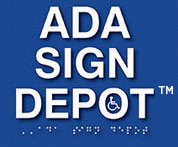One Business Owner’s Experience with HB 2
ADA Sign Depot
April 10, 2016

A Business Owner’s Experience with HB 2
Source: Indy Week
by Matthew Poindexter
Much of the focus on the aftermath of House Bill 2—the anti-LGBTQ, fair-wage, and worker-protection legislation signed into law March 23—has centered around Charlotte and Raleigh until this point. PayPal killed a plan to create four hundred new jobs in Charlotte, and the NBA may move its 2017 All-Star Game out of the city’s Time Warner Cable Arena. Governor Pat McCrory lives in the capital, of course, and it’s where the legislature gathered to rush through this mess of a bill.
But an April 3 incident at Guglhupf Bakery, Cafe and Restaurant brought some of that attention to Durham. Two Guglhupf employees, Rob Chamberlain and Jen Myers, posted signs on the gender-specific bathrooms of the celebrated German restaurant. “All gender identities and expressions welcome,” Chamberlain and Myers’s signs read, followed by the familiar #WeAreNotThis slogan.
For Guglhupf owner Claudia Cooper, the signs were a problem. In a Facebook post published April 5, Chamberlain wrote that Cooper removed the signs: “We had a long conversation with the owner who maintained that she’d rather keep her business apolitical, so as not to risk alienating customers, and potentially receiving hate mail.” In response, Chamberlain and Myers quit their jobs at Guglhupf. (Chamberlain declined to say more; Myers could not be reached for comment despite multiple attempts.)
A day after the Facebook post, Cooper’s alleged desire to remain apolitical and avoid alienating customers was failing. Chamberlain’s story had spread quickly, and Guglhupf’s social media accounts received a stream of once-loyal customers promising to boycott the restaurant. Cooper responded at a press conference on Wednesday.
“Last Sunday I was presented with an emotionally charged ultimatum in the heat of the moment. I was forced to make a decision that affects my entire business, and all the employees who make it possible,” she explained. “I chose to respect all of them by not bending to the desires of two employees demanding that I act without thought or in full consideration of the ramifications of the actions they supported. They have chosen to act in a manner that can be seen as destructive to my business, and I feel that at this point I must speak publicly.”
Cooper expressed contempt for House Bill 2, saying, “I abhor HB 2 and all the ways it divides people.” However, she claimed that, “to maintain compliance with the Americans with Disabilities Act, we must maintain separate, and gender specific, facilities by laws irrespective of HB 2.”
Cooper did not address Chamberlain’s claim that she did not want to take a stand on HB 2 and risk hurting business. After the press conference, Chamberlain took to Facebook to express support for Cooper’s renouncement of HB 2, writing, “Guglhupf is not an evil company, and the owner does not deserve disrespect.” Myers, meanwhile, encouraged customers to not start a proposed boycott.
To meet federal ADA minimum requirements, restroom signs must have a number of specific features, including gender pictograms, the International Symbol for Accessibility pictogram to show whether the restroom is wheelchair accessible, tactile letters showing who the room is for, and a Braille translation of the words on the sign. The sign posted in Guglhupf by Chamberlain and Myers, consisting of only words handwritten on a piece of white paper, met none of those marks. They also didn’t cover the pre-existing signs.
The restaurateur’s ADA excuse highlights an important aspect of the issues with HB2—it presents a confusing, contradictory mix of state and federal laws that can be difficult to understand when applied simultaneously. (Cooper did not respond to multiple asks for comment after the press conference.)
All-gender restroom signs can be ADA compliant, though, and according to multiple sources, Cooper is mistaken in her belief that House Bill 2 applied to Guglhupf at all. Josh Ellis, a spokesperson for Gov. Pat McCrory, told The News & Observer that House Bill 2’s bathroom restrictions only apply to government facilities. Ellis’s comment was corroborated by Jeff Welty, an associate professor of public law and government at the UNC School of Government.
“[HB 2] doesn’t prevent private businesses from making multiple occupancy bathrooms available by gender identity,” Welty wrote on the North Carolina Criminal Law blog.
But what HB 2 doesn’t ban, the current North Carolina Plumbing Code may actually disallow, says Luke Hirst. The 2012 North Carolina Plumbing Code, which was altered last year, makes multi-gendered, multi-stall restrooms impossible. “Where plumbing fixtures are required,” it says, “separate facilities shall be provided for each sex.”
Still, many other restaurants and businesses have offered unisex facilities, especially since HB 2’s passage. As part of Durham Unstalled, Hirst has worked with Durham businesses to redesignate single-occupancy gendered bathrooms as unisex and seeks to raise awareness about bathroom accessibility issues. Despite that restriction, Hirst argues that the Guglhupf owner’s actions are still painful for trans people, and that it is impossible to be apolitical on the issue.
“Single-gendered bathrooms are sites of fear and discomfort for people in your community,” Hirst told a crowd at Everybody is Welcome, a community support event at Bull City Cool Food Hub on Wednesday.
“Being neutral is actually doing harm to lots of people,” Hirst said later in an interview. “It’s not possible to be neutral about people’s worth and people’s beings. Not everyone can leave their job. I know people who work at Guglhupf, and they feel unsafe there. Guglhupf is a member of our community. We as a community must hold them responsible.”
On Wednesday, Guglhupf started the process of appeasing the employees and patrons who felt injured when Cooper took down Chamberlain and Myers’ signs. The owner highlighted the restaurant’s three unisex single-occupancy restrooms. And while the single-gender restrooms stayed the same, new signs of support for people of all genders appeared nearby—this time with Cooper’s blessing.
- Tags: Restroom Bathroom ADA Signs Subscribe to this blog's RSS feed.


